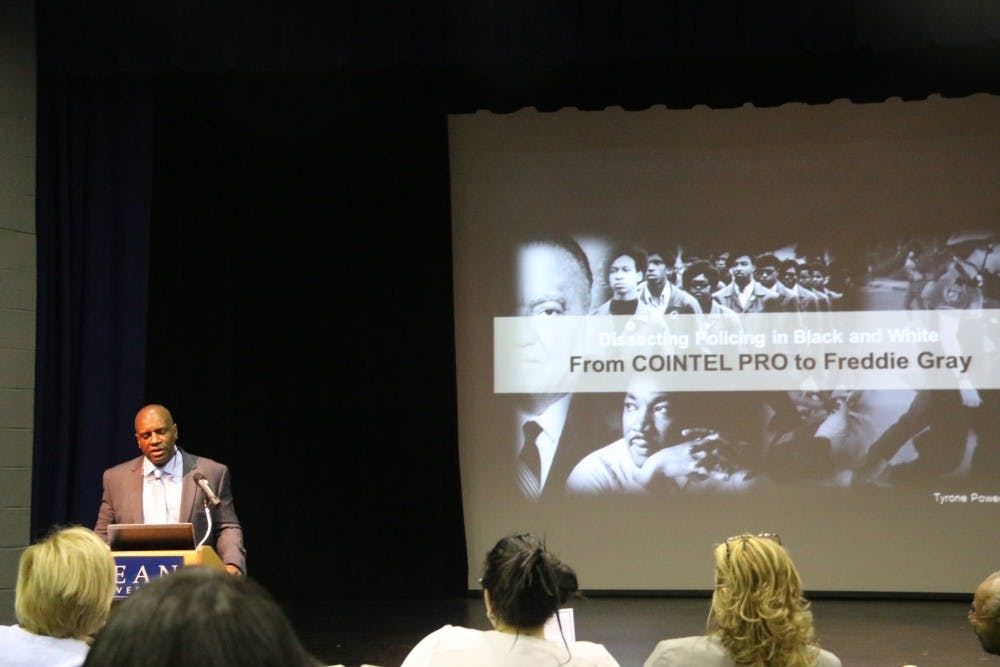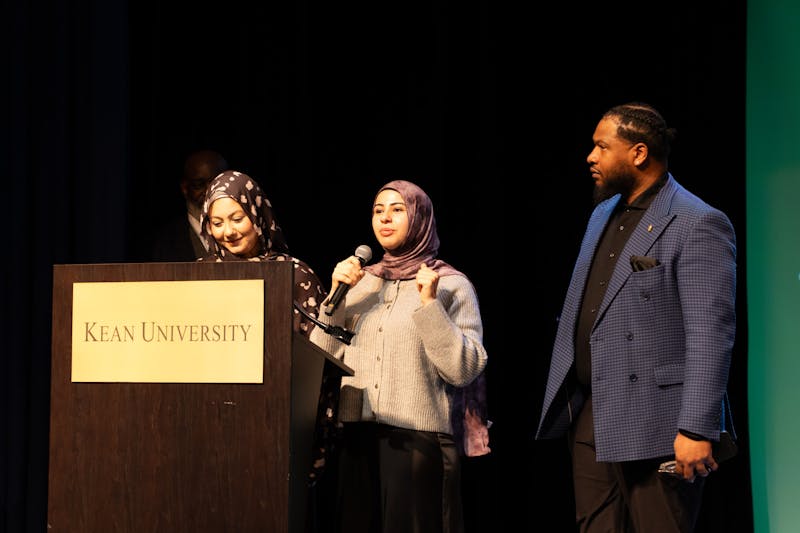On Wednesday, Feb. 21, Tyrone Powers, Ph.D., presented "Dissecting Policing in Black and White from COINTELPRO to Freddie Gray" in heart of Black History Month.
The event was hosted by the Office of Africana Studies and was held in the Miron Student Center Little Theater. It serves as Part II of the Office of Africana Studies's Series called "African People and Law Enforcement in the Age of Trump, Part II."
Powers, Ph.D., is currently the director of the Homeland Security and Criminal Justice Institute at Anne Arundel Community College in Arnold, Maryland and a consultant for legal teams for criminal and civil law cases. He is also the CEO and co-founder of the Children First Movement and the People's Plan to Dramatically Reduce Crime in Baltimore City. He had also previously worked as a Maryland state trooper for four years and a special agent with the FBI for 10 years.
Powers began by talking about the history and context of policing toward the black community explaining that policing has always been to control—not to serve and protect. This change in terminology from "policing" to "law enforcement" occurred after the 1960s after this rise of civil rights movements. This change translates to a lot of force being used on people of color especially.
Powers notes that the significance of knowing this difference in concepts is that, "You can never effectively counter that that which you do not fully understand."
He then proceeded to explain the FBI's mission called COINTELPRO—a program meant to "neutralize political dissonance." Powers emphasized that the program was not to neutralize criminals, but to neutralize anyone who did not agree with the politics of the government. He then clarified that this information is not a conspiracy theory and is factual and available on public records. Despite having the access to such precious information, Powers observed that people do not use it to their advantage because of their lack of education on the subject.
Powers then proceeded to explain the program's strategy: to infiltrate, deceive, harass, intimidate, and incite violence. The FBI admitted to using agent provocateurs to cause havoc within black programs and communities. The agent provocateurs had the potential to destroy organizations by creating gossip and rumors that would undermine the reputation of the organization, ultimately bringing the demise of that organization or the leader of the organization. Unfortunately, they were extremely successful with this strategy.
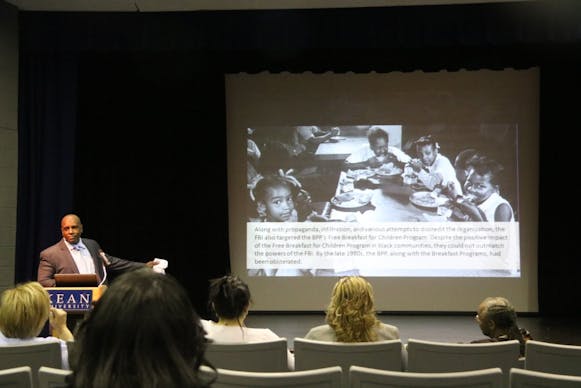
Powers explained how the COINTELPRO was used against the Black Panthers. The Black Panthers we know today as being very violent were actually very beneficial to the black community. The Black Panthers held a Breakfast for Children program that was extremely successful and put the group in a good light. As a consequence of their good deeds, the FBI sabotaged the program by spreading rumors that the children's food was poisoned to make the Black Panther's reputation falter and keeping the Black Panther Party from gaining new members.
Powers then put into perspective the actual logistics of police brutality on people of color to give the audience an understanding of the actual scale of injustice. The data showed the degree in which the police force targeted people of color. Powers also took into consideration that, because policing today is about control, police are consequently more likely to use deadly force against the groups they deem less worthy.
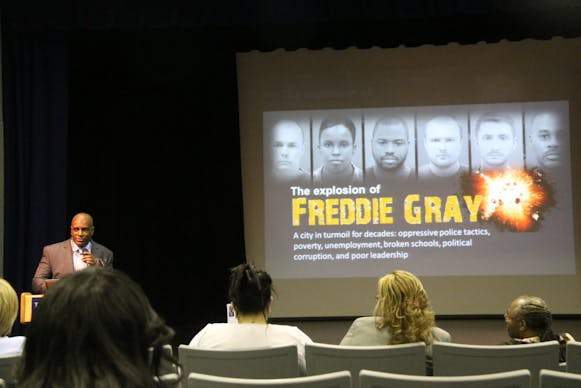
Freddie Gray's death is an example of police targeting people of color. Gray was an African-American man who lived in an area with high crime rates who was later captured and killed by police because they believed he could have done something wrong.
"When you identify or target a people as being the criminal element, they can die under any kind of circumstances," Powers stated.
Powers then brought up the Korryn Gaines case. Gaines was an African-American woman who was stopped at a traffic stop by police. The matter was handled well, and Gaines was simply given a ticket. She did not appear in court the day of her court date to handle the traffic ticket. The police issued a warrant for her and went to her apartment to make the arrest. The police struggled to get Gaines out of her apartment who was holding her legally owned shotgun for protection. Unfortunately, the struggle ended when Police Officer Royce Ruby shot through the wall, resulting in the killing of Gaines and the injuring of her five-year-old son.
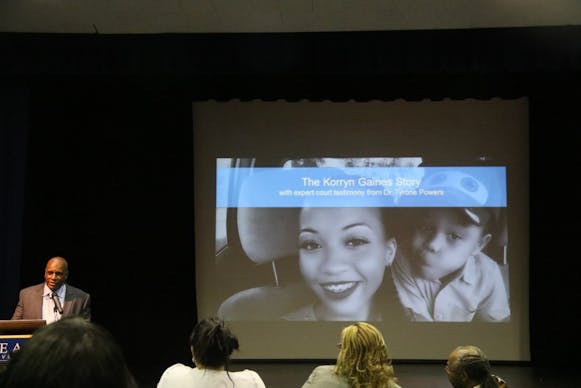
Uniquely, a jury awarded Gaines's son $37 million dollars because she was not a threat to the officers. She was not a threat despite having held a shotgun because she was facing away from all the officers and made no moves to injure the officers. The circumstances should not have led to the outcome, but they were a result of an officer's impatience and lack of consideration.
Although this was a victory in the court, it would not bring back Kodi Gaines's mother.
After the case, all police were forced back into training. The case shows the importance of these types of cases and lawsuits in changing the police system.
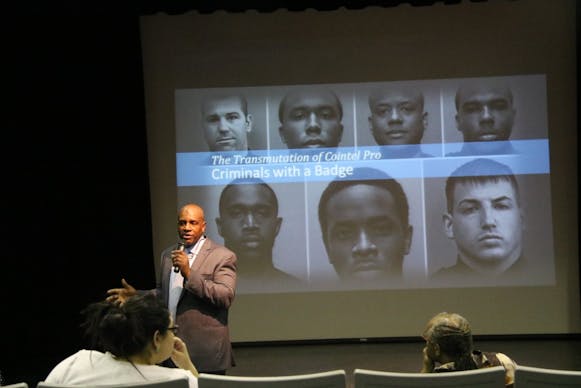
The next case Powers discussed was about a special unit of police officers whose job was to get guns off the streets of Baltimore, Maryland called the Gun Trace Task Force. The entire unit of six officers were convicted of robbery, planting drugs on people, and murder.
Interestingly, six out of the eight officers pled guilty and gave testimony of all the crimes they committed. They did this as part of their plea deal in which they would be sentenced with less time in turn for revealing all the wrong they had done.
In this particular case, the men were giving testimonies for they had been in a high chase against someone they weren't supposed to be chasing. According to Powers, the chase went awry, and thus the officers planted drugs and were prepared to place toy guns by the body to cover up the crime.
The case is quite concerning in that the men admitted to having done these types of crimes since 2005 and have likely incarcerated many innocent individuals.
The FBI group involved in the investigation believes that because an entire unit was able to get away with such atrocities, it is likely that many others were aware of it.
Powers emphasized that this unit's success is partly attributed to the fact that even civilians are convinced that a police officer's word is always true and good. He believes this case helps to remind citizens to be wary. Powers encouraged the audience to go back into the records of the case in order to understand the full extent of corruption.
Powers remarked that in order to change the behavior in police departments, communities and one's people, it is necessary for parents and children alike to become better educated on all the topics he discussed and more.
He emphasized that, "A 20-second decision can control where you spend the next 20 years of your life."
Powers outlined that first, parents must teach their children the history of policing. Next, parents must completely explain the criminal justice system to them. Lastly, parents must tell their children what to do when stopped by the police.

He also encouraged the idea of nurturing children into becoming good police officers. He explained how it is a noble profession when done right and also has a limited number of layoffs. He presented to the audience that they themselves were capable of making the good police officers they hoped for.
To make this change, however, it is imperative that parents and children alike go back and educate themselves with history in order to fully empower themselves to make the change this justice system needs.


